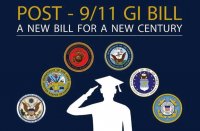Schools that have Yellow Ribbon Program
 Back to Civilian Life – Time for a Career in Film?
Back to Civilian Life – Time for a Career in Film?
A great deal of column inches are (rightfully) devoted to the challenges veterans face when returning to civilian life. As most of us are painfully aware, it’s already hard enough to make ends meet in the current economic climate; try adding the difficulties of returning home following years of active duty, and that’s only half the story.
Luckily, we live in a society in which we give back to those who have risked their lives to look after us.
Numerous laws and pieces of legislation are in place to make the transition back into civilian life a little easier for returning veterans, and today we’re going to be looking at the Post 9/11 GI Bill (and the Yellow Ribbon Program), particularly when it comes to trying out a totally different career.
Rising to the Challenge
Changing career paths is daunting to the best of us, but veterans are well suited to tackling challenges. After all, it’s a personality trait which made them great service people in the first place!
One industry which is as challenging as it is rewarding is new media, and an increasing number of veterans are looking to put, bring their prior experiences and skills to the table. The creative arts in particular is a booming sector – figures suggest that the film industry (especially in the US) is set to grow exponentially for the foreseeable future.
There isn’t a question as to whether service people are suited to a career in film. The kind of skills needed to excel in the industry (whether it’s as an actor, director or screenwriter) include:
- An ability to coordinate numerous individuals
- strong communication skills
- A talent for empathizing with others while being able to surpress this trait when business needs to be done
- An ability to plan for any eventuality, right down to the last detail
If you’re an ex-service person, at least one if not all of those probably strike a chord. As such, you might be wondering if it’s actually possible to get into the industry, or if such lofty aims are just an unrealistic (and expensive) pipe dream…
… happy to report you might be pleasantly surprised.
What About the Cost?
It’d be silly to pretend that not only is getting back into higher education a big step, but it also brings with it a large financial consideration. The latter issue however is less of a burden for veterans however; thanks to the Post 9/11 GI Bill, most (if not all) tuition fees are usually covered.
There are some caveats to the funding, although these tend to be fairly easy going. The main stipulation is that the veteran in question should have received an honorable discharge (or received a discharge due to work-related injuries) and has served at least 90 accumulative days of active duty.
The latter point is worth noting – benefits are still open to those currently on active duty, but the situation gets a little more complicated. A complete guide to entitlements and eligibility can be seen here.
Otherwise, as well as up to 100% of tuition fee coverage, veterans can usually expect help with housing, textbook costs and even relocation allowances.
The great news is that the benefits offered under the Post 9/11 GI Bill come with no restriction; they can be used equally at state schools or private education institutions. This is handy when it comes to studying filmmaking, since most of the best training is offered privately.
You might also like





